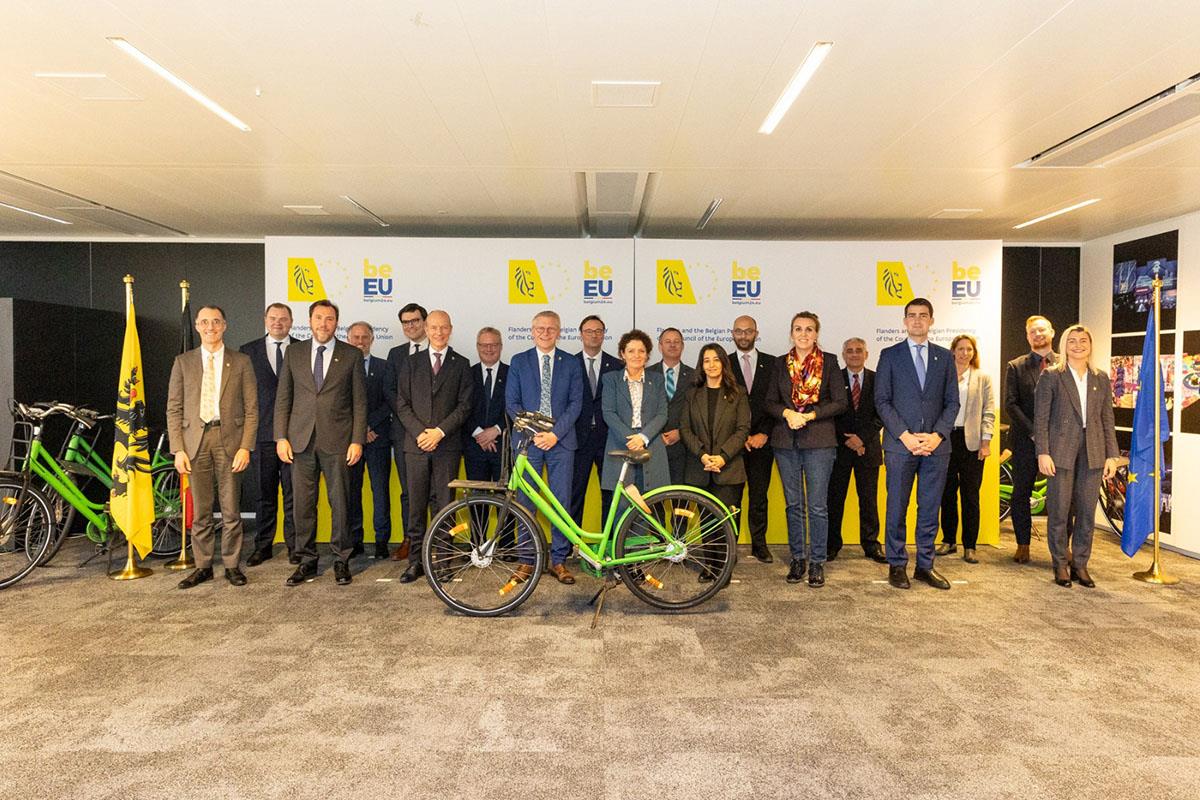Óscar Puente reiterates Spain's commitment to making the bicycle an everyday means of transport
News - 2024.1.30
 The Minister for Transport and Sustainable Mobility, Óscar Puente, with the participants in the high-level conference on cycling
The Minister for Transport and Sustainable Mobility, Óscar Puente, with the participants in the high-level conference on cycling
This is what the minister said during his speech at the high-level conference on cycling, held yesterday and today in Hasselt (Belgium), in the framework of the Belgian Presidency of the Council of the European Union.
The meeting, structured into three high-level panels and an inter-institutional session in which the minister participated, sought to develop and strengthen cycling policies throughout Europe and to discuss how to implement the European Declaration on Cycling, which was presented in Seville by the European Commission on 4 October, as part of the Urban Mobility Days, an event co-organised by the Spanish Presidency of the Council of the EU and the Commission.
In the session he shared with his European counterparts, Óscar Puente pointed out that it is essential for many Member States to have a European policy that promotes active mobility, as there are still considerable differences between countries in cycling and in the availability of funds to develop safe cycling infrastructure.
"I would like to draw your attention to something that is happening in Spain after the last local elections as some of the infrastructures built in recent years with European funds are being destroyed. We need the help of the European Union. We need a policy that promotes active mobility. I am convinced that the bicycle must become another symbol of the European Union and to achieve this, we must be proactive and reach out to many European citizens," said the minister.
Hence the relevance of the European Declaration on Cycling and the boost to cycling policy that will continue to be given in the next European legislature.
The head of the department stressed that one of the priorities is to raise awareness of cycling through health, education and road safety programmes, especially for young people, as is being done in Spain. He called for this to be done in coordination with local and regional authorities, to help them establish safe cycle paths, specifically designed cycle parking and bike sharing services.
Great effort by Spain
Óscar Puente highlighted the great effort that our country is making in the development of this policy. Thus, in order to achieve the objective of placing it alongside the countries that are leaders in this field, Spain has had a State Strategy for cycling since 2021, which aims to develop governance and investment criteria, and which has been included in the Safe, Sustainable and Connected Mobility Strategy 2030. In addition, the new Sustainable Mobility Law will give new impetus to its deployment in the future.
In this line, our country is making significant use of various national and European funds to promote active and decarbonised mobility, financing, for example, the construction of new cycling infrastructures and investing more than ever in this mode of transport. However, as he emphasised, this policy must be accompanied by new funds.
The minister mentioned some of the measures that the Spanish government has adopted to promote cycling, including a guide with recommendations for the deployment of cycling infrastructures; an IT tool to improve the safety of road and sports cyclists; and others to improve intermodal connections, such as between cycling and rail, whether it is bicycle parking at train stations or making it easier for people to travel with a bicycle on board. In this respect, he argued that the EU can play an important role in promoting such measures.
At the inter-institutional session, the Transport Commissioner stressed that the implementation of all these measures should be followed up by including cycling studies in the overall transport reports, or by creating a network of cycling focal points in all Member States.
Bilateral contacts
Óscar Puente took advantage of his presence in Hasselt to hold bilateral meetings with counterparts from other countries and with various European transport officials. In particular, he met with the Belgian Deputy Prime Minister and Minister for Mobility, Georges Gilkinet, who currently holds the Presidency of the Council of the European Union in the field of transport, with whom he shared the importance of promoting active mobility and cycling. He also conveyed our country's support during these six months.
In his meeting with the Flemish Minister of Mobility and Public Works, Lydia Peeters, in addition to sharing his vision of these policies, he was interested in the initiatives currently being carried out in her region.
The last bilateral meeting was with the President of the European Parliament Committee on Transport and Tourism, the French MEP Karima Delli, with whom he discussed the promotion of the bicycle as a tool to achieve a more environmentally friendly transport and with whom he discussed the commitment to railway as one of the main means of transport to achieve this goal, in line with the policies promoted by the European Parliament.
This afternoon, once the event is over, Óscar Puente will be travelling to Brussels to hold a meeting with the European Commissioner for Transport, Adina Vălean, in which, in addition to thanking her for the collaboration of the European Commission during the Presidency of the Council, matters of interest to Spain in terms of transport will be reviewed, including the development of cross-border connections of the Trans-European Transport Network, the current call for CEF funds (CEF Transport 2023), or the concern about the implementation of the new Directive on the ETS (Emissions Trading System) in maritime transport, etc.
Non official translation




